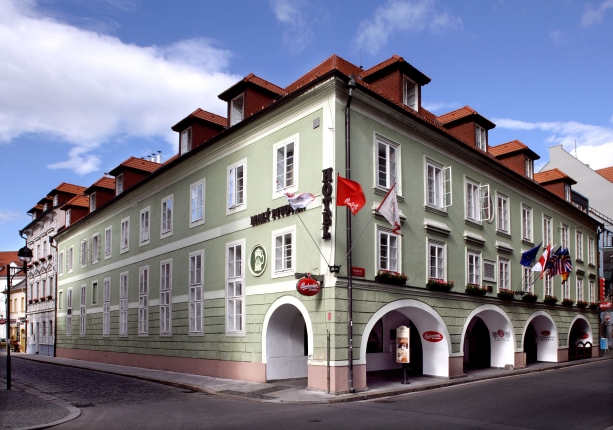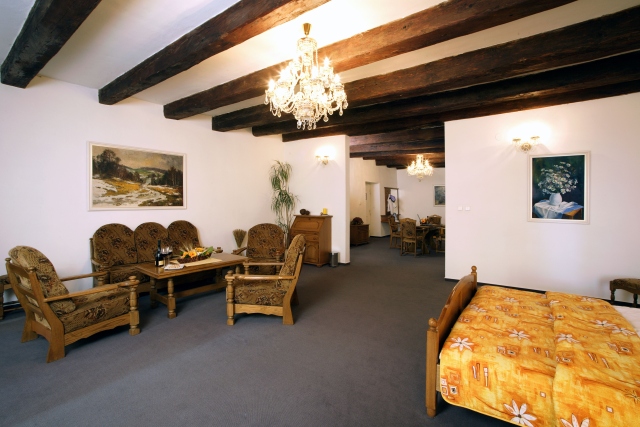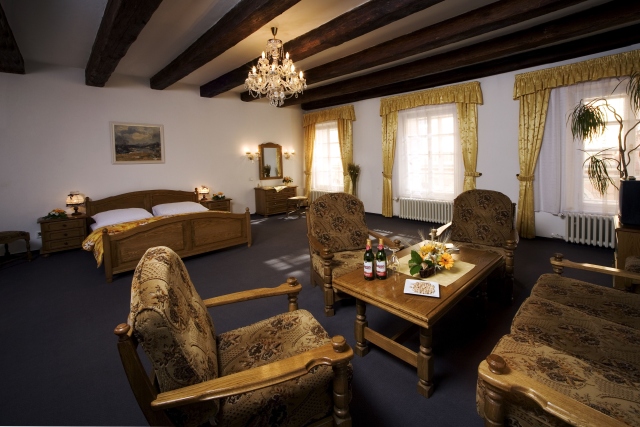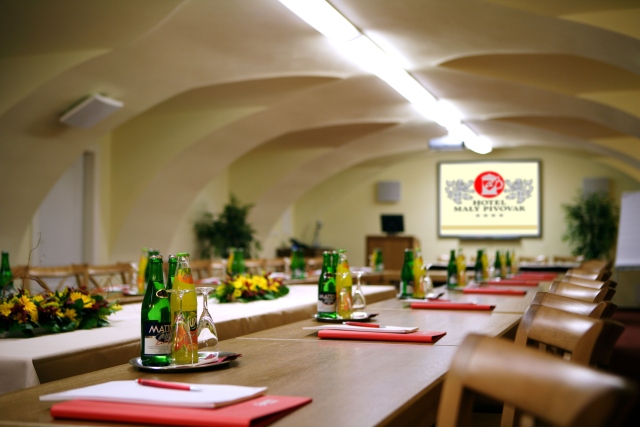The History of the Hotel
A brief historical introduction The city České Budějovice was founded by the Bohemian King Přemysl Otakar II in 1265. The original Charter did not come down but we know its content from the latest confirmation of Vladislav Jagelonský in July 2, 1507. From the Charter we know about the foundation of the St. Maria`s Monastery and the city based on the confluence of the river Vltava and the Malše, but you can not find there anything about the beer brewing right. Any other document where you can find anything about a grant of the beer brewing right did not come down, too. Despite that the grant of this kind of right came into existence during the foundation of the city, because from 1300 a huge donation of a brewer Zachariáš is documented and thanks to this event the St. Vaclav`s Hospital was grown up. But this is not the only proof of a richness of local brewers. Getting such a property is connected with a very intensive work in the branch. It appears that the city was granted by the beer brewing right probably during the foundation of the city or few years latter.
The fact that the beer brewing right was a very important kind of rights, connected with the prosperity of the city, is supported by the grant of a mile law by the King Charles IV (1351) and its confirmation by the King Václav IV (1410). The document where you can read about the grant of a mile law speaks directly about the prohibition of breweries, malt houses and taverns within one mile from the city.
The beer business prosperity brought the city council after negotiations with townsfolk to the foundation of their own brewery (1495). The brewery was originally situated in Široká Street near to the Rožnovká Port. The malt house was in the back part of the old town hall. In the beginning of 16th century the brewery was extended into today`s Divadelní Street. The city council reserved itself the privilege to brew “white” beer and townsfolk could go on brewing “dark” beer.
In the beginning of 16th century the “white” beer was very popular at the princely court. Roman and Bohemian King Ferdind I tried white beer during his visits of České Budějovice. In 1547 he invited a local brewster to his royal court to brew beer for him by the local way.
From the beginning of 18th century there was a contest for an administration of a municipal brewery between local brewers and the city council. Townsfolk argued that they were entitled to brew all kinds of beers in the city until 1495 and they wanted to get this right back. In 1722 the city council actually decided to give them the right back but under the condition that they will stop brewing beer in their houses. This was the reason why they bought a brew-house from Matěj Konvička, calls the Malý Pivovar. But the city council declared that the house will stay in a city property and “benevolently” allowed to townsfolk to use it for a half of a year. From that time the city owned two breweries: The Velký Pivovar next to the Rožnovská Port and the Malý Pivovar located at the corner of Karel IV Street and Kněžská Street. Townsfolk protested against this solution and the whole dispute ended in 1795 when the city was given both breweries to the administration of townsfolk. Except of that townsfolk got a lumberyard and a cellar and for a low rent an official apartment for employees as compensation. The so called “Měšťanský” brewery came into being and from 1894 it was known under an official name: Die Budweiser Bräuberechtigten - Bürgerliches Bräuhaus Budweis, gegründet 1795. Beer was brewing for townsfolk in the Malý Pivovar, while the Velký Pivovar catered taverns by beer and exported beer out of the city.
While the number of houses where beer was really brewed went slowly down, the number of the brew beer right in a final sum increased. In 1750 about 340 townsfolk owned a brew-house in the city (with the beer brewing right). The final number was definitely restricted in December 12, 1907. From that time there were available 387 beer brewing rights. It practically means that almost every house located in the historical part of the city was a brew-house. From the number were excluded a city fortification, a town hall, churches, “Masné krámy”, an episcopate, a theatre, objects of breweries (after the termination of the production in the Malý Pivovar a new owner of the object received the beer brewing right) and some houses which owners had not in České Budějovice the right of domicile.
A short history of the object Malý Pivovar – the house located at the corner of Kněžská Street and Karel IV Street, which arose from the connection of houses no. 334 and no. 333.
In 1722 the city council accepted recommendation of seniors and met townsfolk wishes to participate not only on brewing beer but understandably on division of profits. The agreement of the city council was given under the condition that townsfolk will give up of brewing beer in their houses and for this purpose will use only an intended object. The optimal object for this purpose was chosen a house of a brewster Matěj Konvička (no. 334) which was equipped with a necessary arrangement.
Very interesting is the fact that the name Malý Pivovar was created before the time when it (house no. 334) was bought and illegally made over to the city. We could find in city books a record from 1714 (eight years before the buy of the Konvička`s house) that Martin Kacžler got by marriage a house which was situated opposite to the Malý Pivovar (OA ČB, Libri contractuum civilium, XI,32).
Because of that the theory about calling the object the Malý Pivovar from the assignation by the town hall to distinguish it from the Velký Pivovar was not truthful. On the other hand this proves a strong tradition on brewing beer in that object.
The house located at the corner of Kněžská Street and Karel IV Street was founded and built in first years after the foundation of the city. This proves late-Romance and Gothic components which came down in the basement of the house. This house had the beer brewing right and probably was used for beer brewing from the beginning of its existence.
The first record about beer brewing in the house comes from 1589. In this year a brewster Jan Walschy got the house by marriage with a widow Anežka Kotterová. There is not directly written that the beer was brewed there but there is a real presumption that the brewster really brewed beer. Another record about brewing beer in the house comes from 1611 when Veronika Kotrovská came in for the house from his husband who was probably a son of Anežka Kotterová. There are some records about brewing beer in other documents, too. In 1690 the house was got by marriage by a brewster Vít Victorin and in 1716 by the known Matěj Konvička. The price of the house was about 350 “kop” in 1541 and 800 “kop” 1716 (this data comes again from Libri contractuum civilium).
In the end of 18th century it was decided to enlarge the Malý Pivovar. For this purpose the object no. 333 in Kněžská Street was bought in 1809. The reconstruction cost 69 886 “zlatých” and happened during 1813-1816 (records say in 1815). Except of beer alegar was made in the brewery. Ten employees worked in the brewery: an administrator and a clerk in one person, a brewster, an underbrewster and seven assistants. Another reconstruction was in 1839 when both houses were put together into the one object. In 1852 a kiln was reconstructed by an architect Sandner.
When the house no. 334 was bought from Matěj Konvička the house stopped being a brewing house. The house no. 333 lost its beer brewing right after his joining the object of the Malý Pivovar till 1856 when The Malý pivovar closed was. After that the whole object was sold and became one of the brewing house but with the prohibition to brew beer in the object.
Finally the object was made over to the city. It was several times reconstructed and modernized. In 1996 the object made over to the Budějovický Budvar, n.e. which made from it one of the most considerable centre of a hospitality in České Budějovice. Presently you can find there The Malý Pivovar Hotel.
Č. Budějovice, 5. 8. 2003
Zpracoval: PhDr. Ivo Hajn











